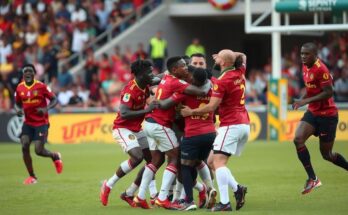South Africa’s rugby team has recently secured a 48-7 victory over Argentina, affirming their dominance by holding all major southern-hemisphere trophies. Under the guidance of Rassie Erasmus, the team has evolved into a precise and skillful unit, combining traditional strength with innovative play. Key players such as Ox Nché and Cheslin Kolbe showcased exceptional abilities, while the Pumas displayed resilience despite the loss. The future of rugby appears uncertain, raising questions about the sustainability of competition among southern-hemisphere teams.
The South African rugby team continues to assert its dominance in international rugby, having secured every significant trophy available to southern-hemisphere teams, including two World Cups, a British & Irish Lions series, and the Rugby Championship. This impressive accumulation of titles raises comparisons to the legendary All Blacks of Richie McCaw and Dan Carter, a dialogue prompted by the transformative leadership of Rassie Erasmus, highlighting the potential of this emerging team. The recent victory of 48-7 over Argentina showcased all the traditional hallmarks of a Springboks triumph. Ox Nché significantly affected the game with his prowess in scrummaging, contributing numerous penalties in the first half. Eben Etzebeth, now with a record 128 caps, played a memorable game, demonstrating exemplary leadership. Furthermore, Pieter-Steph du Toit manufactured two tries and displayed remarkable control at the breakdown. However, what is particularly noteworthy about this match was the Springboks’ ability to execute decisive and precise plays, setting them apart from prior iterations known for more brute force tactics. South Africa’s performance against Argentina, a team that had previously triumphed over New Zealand and delivered a historic defeat to Australia, illustrates their clear intentions to maintain their supremacy as they enter the next World Cup cycle. Key players, such as the electrifying Cheslin Kolbe and the creative fly-half Manie Libbok, continue to reshape the narrative around South African rugby. Kolbe’s dynamic playstyle has drawn comparisons to Antoine Dupont, while Libbok’s unorthodox kicking and playmaking abilities have revolutionized the traditional role of the fly-half for South Africa. Despite a lull in performance during the second half, potentially due to fatigue from their strenuous World Cup victory last year, the Springboks demonstrated resilience. Argentina, under Felipe Contepomi, has shifted to a more adaptive gameplay, turning challenges into opportunities and developing a new sense of confidence on the field. As the rugby landscape faces uncertainty, with speculation around the future involvement of teams like the Wallabies and Pumas in lucrative international fixtures, these two teams present a positive narrative. With South Africa continuing to thrive, as remarked by Etzebeth, who described rugby in his country as a “religion” and a source of pride, the Springboks remain focused on their primary goal—victory. Under Erasmus’ guidance, characterized by their evolution into a multifaceted and skilled team, they will likely achieve further successes in the upcoming European tour, where victories over England, Scotland, and Wales could solidify their status as the leading team globally.
The piece discusses the current state of the South African rugby team, emphasizing their success and competitive standing in international rugby. The Springboks have dominated the sport in recent years, capturing significant titles and accolades under the leadership of coach Rassie Erasmus. The discussion includes their recent match against Argentina, analyzing their style of play, key players, and the implications of their performance. The article also mentions concerns regarding the competitive future of southern-hemisphere rugby, particularly the involvement of the Wallabies and Pumas amid evolving tournament structures.
In conclusion, South Africa’s rugby team is positioned as a formidable force in international rugby, having earned a distinguished place in the sport’s hierarchy. Their recent victory over Argentina highlighted their evolution into a team capable of blending power with precision. The emergence of key players and the strategic direction provided by Coach Rassie Erasmus signify a promising future ahead, as they aim to transcend their current achievements and assert their dominance in the upcoming European tours and beyond.
Original Source: www.theguardian.com




